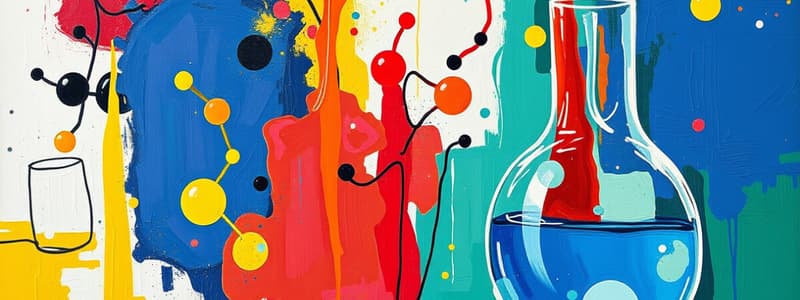Podcast
Questions and Answers
What is formed when sugar dissolves in water?
What is formed when sugar dissolves in water?
- Dissolution
- Liquid
- Solid
- Solution (correct)
Which type of mixture is created when orange juice powder is mixed with water?
Which type of mixture is created when orange juice powder is mixed with water?
- Concentrated mixture
- Insoluble mixture
- Homogeneous mixture (correct)
- Heterogeneous mixture
Biko, nilupak, and buko salad are examples of what kind of mixture?
Biko, nilupak, and buko salad are examples of what kind of mixture?
- Solid
- Heterogeneous (correct)
- Liquid
- Homogeneous
Which of the following best describes a heterogeneous mixture?
Which of the following best describes a heterogeneous mixture?
What is the other term for a homogeneous mixture?
What is the other term for a homogeneous mixture?
Which example represents a gas in a liquid solution?
Which example represents a gas in a liquid solution?
When sugar dissolves in water, which component acts as the solute?
When sugar dissolves in water, which component acts as the solute?
What actually occurs to the sugar particles when they dissolve in water?
What actually occurs to the sugar particles when they dissolve in water?
What best describes the meaning of solubility?
What best describes the meaning of solubility?
Which of the following statements is incorrect about solubility?
Which of the following statements is incorrect about solubility?
What factor does not influence the solubility of substances in a mixture?
What factor does not influence the solubility of substances in a mixture?
How do solute particles behave in a suspension after mixing?
How do solute particles behave in a suspension after mixing?
Which mixture exemplifies a suspension?
Which mixture exemplifies a suspension?
What does miscibility refer to in terms of solubility?
What does miscibility refer to in terms of solubility?
Which of the following is not considered a characteristic of a suspension?
Which of the following is not considered a characteristic of a suspension?
In a scenario where nail polish is removed with acetone, which factors affect its solubility?
In a scenario where nail polish is removed with acetone, which factors affect its solubility?
Flashcards are hidden until you start studying
Study Notes
Solutions and Mixtures
- Mixtures consist of two or more substances that are not chemically combined.
- When sugar dissolves in water, it forms a solution, demonstrating the process of dissolution.
- Solutions can be categorized based on their states; for example, gas in liquid is a common type.
Types of Mixtures
- A homogeneous mixture has uniform composition, meaning the individual components are indistinguishable.
- A heterogeneous mixture contains distinct phases or components that are identifiable and do not blend uniformly.
- Foods like biko, nilupak, and buko salad exemplify heterogeneous mixtures due to their visible and separate components.
Characteristics of Mixtures
- The definition of a mixture highlights that it does not create new substances, maintaining the original chemical properties of its components.
- In solutions like sugar in water, components retain their properties even when physically combined, as evidenced by the sweet taste of the solution.
Components of Solutions
- In a solution, the substance that gets dissolved is known as the solute, while the substance doing the dissolving is referred to as the solvent.
- An example of a solution is a sugar solution, where sugar acts as the solute and water as the solvent.
Classification of Solutions
- Gas in gas mixtures, like air, or liquid in liquid mixtures, such as cola or soft drinks, fall under different categories of solutions based on their components’ states.
- The term ‘solution’ is often used synonymously with homogeneous mixtures due to their indistinguishable nature after mixing.
Solubility
- Defined as the ability of a solute to dissolve in a solvent at a specific temperature.
- Influenced by factors like temperature, nature of solute, and solvent quantity.
Miscibility
- Describes a substance's ability to mix evenly and completely with another substance.
- It impacts the solubility of substances.
Factors Affecting Solubility
- Higher temperatures speed up the dissolution of solutes.
- The nature of the solute and the solvent influences dissolving efficiency.
- Particle size affects solubility; smaller particles dissolve faster.
- Stirring plays a significant role in the dissolving process.
Nail Polish and Acetone
- The effectiveness of nail polish removal with acetone relates to miscibility and the nature of both substances.
- Factors such as particle size and temperature may also play a role.
Behavior of Solute in Water
- When mixed with water, solute particles form a mixture.
- In a suspension, solute particles may not dissolve fully and can settle out.
Characteristics of Suspensions
- Suspensions are heterogeneous mixtures where particles eventually settle out after mixing.
- Examples include mixtures that do not completely dissolve, leading to sedimentation.
Mixture Types
- A suspension is categorized as a heterogeneous mixture.
- Contrasts with homogenous mixtures where components are evenly distributed.
Identifying Suspensions
- Particles that do not dissolve and settle can indicate a suspension.
- Not all mixtures with undissolved particles are classified as suspensions; complete dissolution defines homogenous mixtures.
Example of Suspensions
- Mixtures such as flour in water, and oil in water are classified as suspensions due to undissolved particles.
- Water and sugar typically do not create a suspension; they form a solution.
Studying That Suits You
Use AI to generate personalized quizzes and flashcards to suit your learning preferences.




